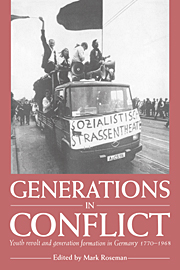Book contents
- Frontmatter
- Contents
- Contributors
- Acknowledgements
- List of abbreviations
- 1 Introduction: generation conflict and German history 1770–1968
- 2 The ideal of youth in late eighteenth-century Germany
- 3 Young Germans and Young Germany: some remarks on the history of German youth in the late eighteenth and in the first half of the nineteenth century
- 4 The battle for the young: mobilising young people in Wilhelmine Germany
- 5 Jewish politics and generational change in Wilhelmine Germany
- 6 The ‘front generation’ and the politics of Weimar Germany
- 7 The New Woman and generation conflict: perceptions of young women's sexual mores in the Weimar Republic
- 8 Generations of German historians: patronage, censorship and the containment of generation conflict 1918–1945
- 9 Gender, generation and politics: young Protestant women in the final years of the Weimar Republic
- 10 The Hitler Youth generation and its role in the two post-war German states
- 11 The BDM generation: a female generation in transition from dictatorship to democracy
- 12 A generation twice betrayed: youth policy in the transition from the Third Reich to the Soviet Zone of Occupation (1945–1946)
- 13 The generation conflict that never was: young labour in the Ruhr mining industry 1945–1957
- 14 The German Kriegskinder: origins and impact of the generation of 1968
- Index
8 - Generations of German historians: patronage, censorship and the containment of generation conflict 1918–1945
Published online by Cambridge University Press: 19 October 2009
- Frontmatter
- Contents
- Contributors
- Acknowledgements
- List of abbreviations
- 1 Introduction: generation conflict and German history 1770–1968
- 2 The ideal of youth in late eighteenth-century Germany
- 3 Young Germans and Young Germany: some remarks on the history of German youth in the late eighteenth and in the first half of the nineteenth century
- 4 The battle for the young: mobilising young people in Wilhelmine Germany
- 5 Jewish politics and generational change in Wilhelmine Germany
- 6 The ‘front generation’ and the politics of Weimar Germany
- 7 The New Woman and generation conflict: perceptions of young women's sexual mores in the Weimar Republic
- 8 Generations of German historians: patronage, censorship and the containment of generation conflict 1918–1945
- 9 Gender, generation and politics: young Protestant women in the final years of the Weimar Republic
- 10 The Hitler Youth generation and its role in the two post-war German states
- 11 The BDM generation: a female generation in transition from dictatorship to democracy
- 12 A generation twice betrayed: youth policy in the transition from the Third Reich to the Soviet Zone of Occupation (1945–1946)
- 13 The generation conflict that never was: young labour in the Ruhr mining industry 1945–1957
- 14 The German Kriegskinder: origins and impact of the generation of 1968
- Index
Summary
Recent commentators on the development of German historiography in the period between the Lamprecht controversy of the 1890s and the Fischer controversy of the 1960s and 1970s are generally agreed that German historicism showed striking resilience. The boundaries of the historicist orthodoxy had been set through a compromise between the exponents of the Prussian school of the 1850s to 1870s (notably Dahlmann, Sybel and Treitschke) and the neo-Rankeans whose intellectual agenda took shape as the contours of the Bismarckian empire were stabilised in the 1870s and 1880s. Where the former, as propagators of a quasi-revolutionary mobilisation, had emphasised the dynamic of the nation, the latter stressed the role of the state as a guarantor of stability – so long, that is, as it was based on the nation. The actions of ‘great men’ in the furtherance of (German) nation statehood, and the power-political ‘epochs’ and ‘missions’ of the nation state, continued to provide the central agenda for German historical writing during both the Weimar Republic and the Third Reich. Historians whose own careers spanned empire, republic and Third Reich included Richard Fester (1860–1945), Friedrich Meinecke (1862–1954) and Johannes Haller (1865–1947).
Intellectual challenges to the dominant understanding of history were not entirely lacking in the years after the First World War. They came respectively from a handful of Left Liberals and from the overlapping schools of Volkshistoriker and Ostforscher whose political sympathies were with völkisch currents. In the conflicts between historicist orthodoxy and these heresies, generational combined with political and methodological sources of antagonism. Left Liberals like G.W.F. Hallgarten (born 1901) and Eckart Kehr (born 1902) waged unequal struggles with their supervisors and examiners.
- Type
- Chapter
- Information
- Generations in ConflictYouth Revolt and Generation Formation in Germany 1770–1968, pp. 164 - 183Publisher: Cambridge University PressPrint publication year: 1995



